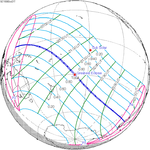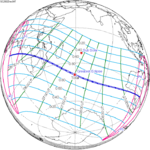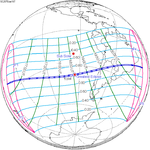Solar eclipse of September 7, 1858
| Solar eclipse of September 7, 1858 | |
|---|---|
 Map | |
| Type of eclipse | |
| Nature | Total |
| Gamma | -0.5609 |
| Magnitude | 1.021 |
| Maximum eclipse | |
| Duration | 110 sec (1 m 50 s) |
| Coordinates | 23°54′S 49°48′W / 23.9°S 49.8°W |
| Max. width of band | 85 km (53 mi) |
| Times (UTC) | |
| Greatest eclipse | 14:09:29 |
| References | |
| Saros | 142 (14 of 72) |
| Catalog # (SE5000) | 9182 |
A total solar eclipse occurred on September 7, 1858. A solar eclipse occurs when the Moon passes between Earth and the Sun, thereby totally or partly obscuring the image of the Sun for a viewer on Earth. A total solar eclipse occurs when the Moon's apparent diameter is larger than the Sun's, blocking all direct sunlight, turning day into darkness. Totality occurs in a narrow path across Earth's surface, with the partial solar eclipse visible over a surrounding region thousands of kilometres wide. It was visible across South America.
Observations[]

Emmanuel Liais from Brazil
Related eclipses[]
Saros series 142[]
It is a part of Saros cycle 142, repeating every 18 years, 11 days, containing 72 events. The series started with partial solar eclipse on April 17, 1624. It contains one hybrid eclipse on July 14, 1768, and total eclipses from July 25, 1786 through October 29, 2543. The series ends at member 72 as a partial eclipse on June 5, 2904. The longest duration of totality will be 6 minutes, 34 seconds on May 28, 2291. All eclipses in this series occurs at the Moon’s descending node.[1]
| Series members 17–41 occur between 1901 and 2359 | ||
|---|---|---|
| 17 | 18 | 19 |
 October 10, 1912 |
 October 21, 1930 |
 November 1, 1948 |
| 20 | 21 | 22 |
 November 12, 1966 |
 November 22, 1984 |
 December 4, 2002 |
| 23 | 24 | 25 |
 December 14, 2020 |
 December 26, 2038 |
 January 5, 2057 |
| 26 | 27 | 28 |
 January 16, 2075 |
 January 27, 2093 |
 February 8, 2111 |
| 29 | 30 | 31 |
 February 18, 2129 |
 March 2, 2147 |
 March 12, 2165 |
| 32 | 33 | 34 |
 March 23, 2183 |
 April 4, 2201 |
 April 15, 2219 |
| 35 | 36 | 37 |
 April 25, 2237 |
 May 7, 2255 |
 May 17, 2273 |
| 38 | 39 | 40 |
 May 28, 2291 |
 June 9, 2309 |
 June 20, 2327 |
| 41 | ||
 June 30, 2345 | ||
Notes[]
References[]
- NASA graphic
- An Account of the Total Eclipse of the Sun on September 7, 1858, as Observed Near Olmos, Peru by Lieut. J. M. Gillis, Published by the Smithsonian Institution, Washington, Smithsonian Contributions to Knowledge, vol. 11, April 1859
- Mabel Loomis Todd (1900). Total Eclipses of the Sun. Little, Brown.
| Wikimedia Commons has media related to Solar eclipse of 1858 September 7. |
- Total solar eclipses
- 1858 in science
- 19th-century solar eclipses
- September 1858 events



